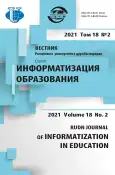System and activity approach to learning artificial intelligence in basic school
- 作者: Levchenko I.V.1, Sadykova A.R.1
-
隶属关系:
- Moscow City University
- 期: 卷 18, 编号 2 (2021)
- 页面: 162-171
- 栏目: COMPUTER SCIENCE TEACHING
- URL: https://journal-vniispk.ru/2312-8631/article/view/321229
- DOI: https://doi.org/10.22363/2312-8631-2021-18-2-162-171
- ID: 321229
如何引用文章
全文:
详细
Problem and goal. The problem of insufficient substantive and methodological support for the training of basic school pupils in the field of artificial intelligence (AI) is considered. The aim is to identify the features of the application of the system-activity approach to teaching basic school pupils in the field of artificial intelligence, to describe the principles of teaching school pupils the basics of artificial intelligence and the conditions for their implementation, to highlight the types of school pupils’ activities in the context of the system-activity approach. Methodology. A set of methods was used: analysis of regulatory documents that determine the priority tasks of our country; analysis of research and scientific and methodological publications in the field of teaching AI for basic school pupils in the domestic and foreign education system; reflection of the content of the knowledge gained; identification of methodological approaches; search for principles, conditions and opportunities for teaching elements of AI to basic school pupils; local pedagogical experiment. Results. A comparative analysis of the methodological experience of predecessor teachers made it possible to identify the possibility and effectiveness of the application of the system-activity approach to teaching basic school pupils in the field of AI. The revealed approach made it possible to determine the fundamental principles of teaching the elements of artificial intelligence, the conditions for their implementation, as well as the most appropriate types of activities for basic school pupils. Conclusion. Today AI technologies are actively developing information technologies and possession of them has a positive effect on the level of information culture of a school pupils, which, in accordance with the requirements of the information society, must be formed, at least, in basic school. The results of the study made it possible to substantiate the possibility and expediency of applying the system-activity approach to teaching the elements of artificial intelligence to basic school pupils, starting from grade 5.
作者简介
Irina Levchenko
Moscow City University
编辑信件的主要联系方式.
Email: levchenkoiv@mgpu.ru
ORCID iD: 0000-0002-1388-4269
Doctor of Pedagogical Sciences, Full Professor, Professor, Department of Informatics, Management and Technology
28 Sheremetyevskaya St, Moscow, 127521, Russian FederationAlbina Sadykova
Moscow City University
Email: sadykovaar@mgpu.ru
ORCID iD: 0000-0002-1413-200X
Doctor of Pedagogical Sciences, Associate Professor, Professor, Department of Informatics, Management and Technology
28 Sheremetyevskaya St, Moscow, 127521, Russian Federation参考
- Korzhuyev AV, Sadykova AR. Pedagogical search: time of changes. Moscow, Saint Petersburg: Nestor-History Publ.; 2018. (In Russ.)
- Korzhuyev AV, Babaskin VS, Sadykova AR. Pedagogical reflection as a component of continuous education of a higher school teacher. Higher Education in Russia. 2013;(7): 77–80. (In Russ.)
- Sadykova AR, Levchenko IV. Artificial intelligence as a component of the innovative content of general secondary education: an analysis of world experience and domestic prospects. RUDN Journal of Informatization in Education. 2020;17(3):201–209. (In Russ.)
- Merenkova PA. World experience in the implementation of artificial intelligence in school education. Modern Information Technologies in Education: Materials of the XXXI International Conference. Moscow, Troitsk: Trovant Publ.; 2020. p. 21–23. (In Russ.)
- Uvarov AYu, Wang S, Kang Ts. Problems and prospects of digital transformation of education in Russia and China. Digital transformation of education and artificial intelligence: Materials of the II Russian-Chinese Conference of Education Researchers (Moscow, 26–27 September 2019). Moscow: Higher School of Economics; 2019. (In Russ.)
- Kartashova LI, Levchenko IV. Methods of teaching information technology to primary school students in the context of fundamentalization of education. Bulletin of Moscow State Pedagogical University. Series: Informatics and Informatization of Education. 2014;(2):25–33. (In Russ.)
- Bosova LL. Modern trends in the development of school informatics in Russia and abroad. Informatics and Education. 2019;(1):22–32. (In Russ.)
- Kondrateva VA. Teaching the basics of Python programming in a school course of informatics. Bulletin of Moscow State Pedagogical University. Series: Informatics and Informatization of Education. 2021;1(55):8–16.
- Levchenko IV. Basic approaches to teaching elements of artificial intelligence in the school course of informatics. Informatics and Education. 2019;(6):7–15. (In Russ.)
- Levchenko IV. Conceptual framework for teaching schoolchildren in the field of artificial intelligence. Mathematics and Informatics in Education and Business: Materials of the International Scientific and Practical Conference. Мoscow: Aegitas Publ.; 2020. p. 320–325. (In Russ.)
- Levchenko IV. The content of teaching the elements of artificial intelligence in the school informatics course. Informatics at School. 2020;4(157):3–10. (In Russ.)
- Levchenko IV, Sadykova AR, Abushkin DB, Mikhailyuk AA, Pavlova AE, Tamoshina ND. Elective course “Fundamentals of artificial intelligence”. Moscow: Obrazovaniie i Informatika Publ.; 2019. (In Russ.)
- Asmolov AG. System-activity approach in the development of new generation standards. Pedagogy. 2009;(4):18–22.
- Asmolov AG, Burmenskaya GV, Volodarskaya IA, Karabanova OA, Molchanov SV, Salmina NG. Designing universal educational actions in high school. National Psychological Journal. 2011;1(5):104–110. (In Russ.)
- Kotova SK. System-activity approach in the implementation of the Federal State Educational Standard of Primary General Education. Concept. 2016;19:37–41. (In Russ.) Available from: http://e-koncept.ru/2016/56247.htm/ (accessed: 15.01.2021).
补充文件









